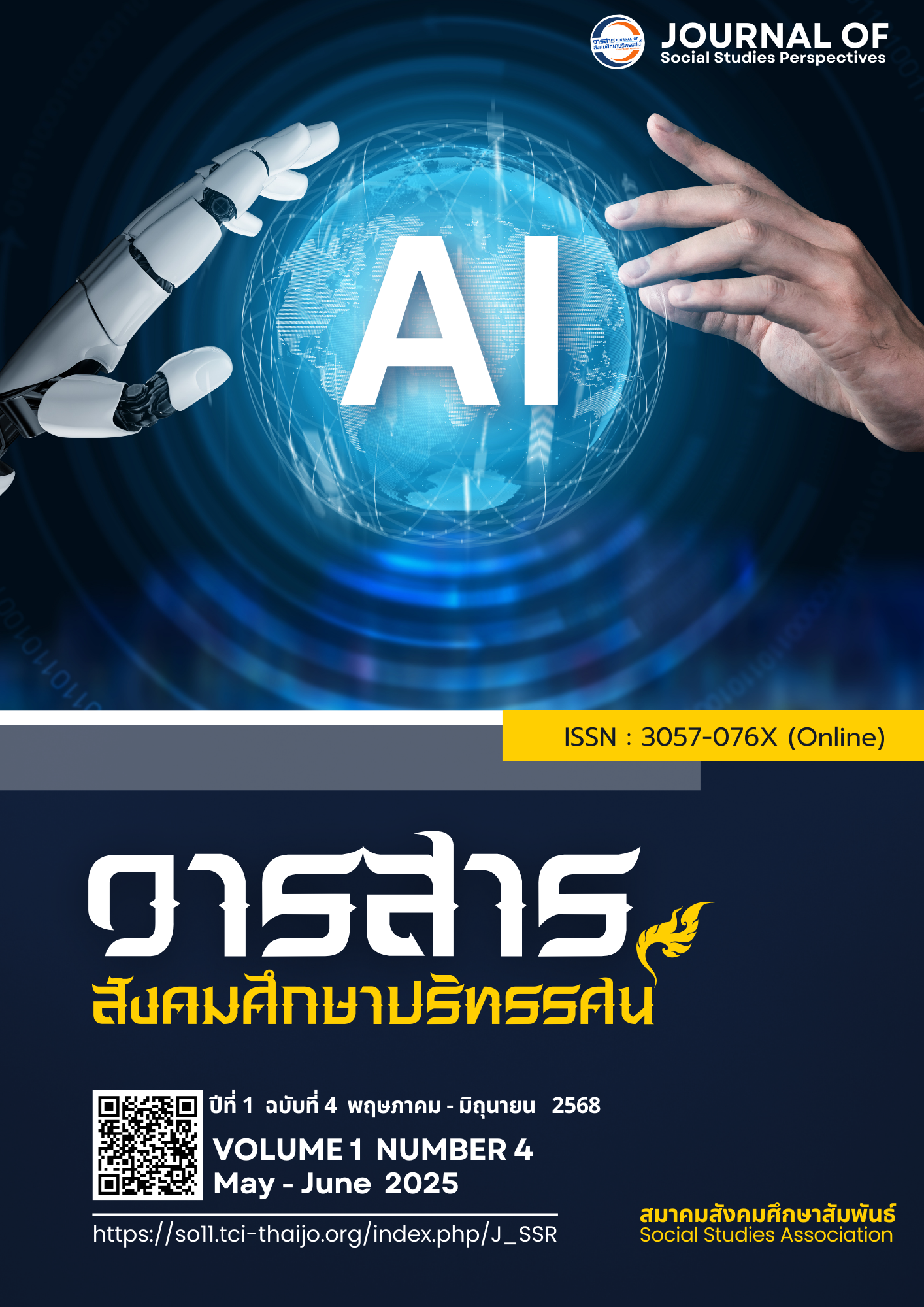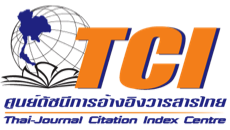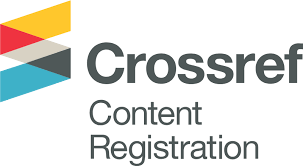A NEEDS ASSESSMENT AND GUIDELINES FOR DEVELOPING SYMBOLIC THINKING SKILLS IN KINDERGARTEN 2 STUDENTS
DOI:
https://doi.org/10.64186/jsp1500Keywords:
Symbolic thinking, Needs Assessment, Experiential Learning ManagementAbstract
This research article aims to: 1) examine the current state, the desired state, and prioritize the necessary needs in developing symbolic thinking skills of kindergarten students in Grade 2, 2) investigate the problems and limitations in developing symbolic thinking skills, and 3) propose guidelines for developing these skills. The research uses a mixed-methods explanatory approach and is divided into three stages: 1) A needs assessment through data collection from 30 randomly selected early childhood teachers using a needs assessment questionnaire, 2) Investigating the problems and limitations through in-depth interviews with 10 purposefully selected teachers using a semi-structured interview guide, and 3) Proposing guidelines for developing symbolic thinking skills through group discussions with 5 early childhood education experts. The quantitative data were analyzed using mean, standard deviation, and the modified priority needs index (PNImodified), while the qualitative data were analyzed using content analysis.
The findings showed that, in terms of the representation of symbolic meanings, the PNImodified index was the highest (0.27), followed by categorization (0.24), and sequencing (0.21). Proposed development strategies include organizing activities linked to daily life, such as storytelling, games, experiments, and problem-solving activities that encourage students to find solutions independently. Experts also suggested supporting learning resources, such as game cards, as well as organizing training to develop teachers' capacity to design activities suitable for the children's context. This research fills the gap in developing symbolic thinking skills and provides comprehensive, practical development guidelines that can be applied in the school context, contributing to the improvement of early childhood education.
References
Auanin, K., Phengsawat, W., & Pheasa, A. (2024). A needs assessment for promoting analytical
thinking skills of early childhood children in schools under Primary Educational Service Area Office 1 Sakon Nakhon. Journal of Graduate School Sakon Nakhon Rajabhat University, 21(95), 54–64.
https://so02.tci-thaijo.org/index.php/SNGSJ/article/view/266014
Awanis, A., Nur Ramadhani, A., & Ines Prabandari, F. (2025). Determinants of Flat Foot
Incidence on Early Childhood Posture. FISIO MU: Physiotherapy Evidences, 6(1), 8–13.
https://doi.org/10.23917/fisiomu.v6i1.7138
Bahena, R., Kilag, O. K., Andrin, G., Diano, Jr., F., Unabia, R., & Valle, J. (2024). From method to
equity: Rethinking mathematics assessment policies in education. Excellencia: International Multi-Disciplinary Journal of Education, 2(1), 121–132.
https://multijournals.org/index.php/excellencia-imje/article/view/281
Creswell, J. W., & Plano Clark, V. L. (2018). Designing and conducting mixed methods research
(3rd ed.). London: SAGE Publications.
Dewi Saputri, I., & Purnama, S. (2024). Implementation of magic box media for early
childhood symbolic thinking. Journal of Childhood Development, 4(2), 434–440.
https://doi.org/10.25217/jcd.v4i2.5081
Elek, C., Page, J., & Eadie, P. (2025). Coaching for early childhood educators: Exploring
pathways of learning and change. Journal of Early Childhood Teacher Education, 46(1), 1–29. https://doi.org/10.1080/10901027.2024.2439879
Gao, H., Yang, W., & Jiang, Y. (2023). Computational thinking in early childhood is underpinned
by sequencing ability and self-regulation: A cross-sectional study. Education and
Information Technologies, 28(11), 14747–14765.
https://doi.org/10.1007/s10639-023-11787-5
Kaosim, J., Suksup, W., Chairattakal, A., Boopasiri, P., & Thipmongkol, S. (2021). The
development of problem-solving ability of the early childhood student by
cooperative art activities feature through the storytelling. NEU Academic and Research Journal, 11(1), 1–13.
https://so06.tci-thaijo.org/index.php/ubonreseva/article/view/251043
Kaosim, J., & Wijakkanalan, S. (2024). Executive functions foundations of early childhood
development in the 21st century. Journal of Roi Kaensarn Academi, 9(7), 964–980.
https://so02.tci-thaijo.org/index.php/JRKSA/article/view/268737
Kaufman, R., Oakley-Browne, H., Watkins, R., & Leigh, D. (2003). Strategic planning for success:
Aligning people, performance, and payoffs. Jossey-Bass; Pfeiffer.
Khamhangphon, M., & Phusing, S. (2024). The program to develop teachers’ capacity in the
management of creativity-based in schools under the Khonkaen primary education service area office 1. Journal of Setthawit Review, 4(2), 257–270.
https://so02.tci-thaijo.org/index.php/Pitchayatat/article/view/24085
Khathippatee, Y. (2024). An Exploring of Upper Primary Level Students’ Democratic in
Mathematics Classroom Using Open Approach. In Mitranun C. (Ed.), Proceedings of
The 9th Srinakharinwirot University National Conference on Education.
(pp. 167 – 184). Bangkok: Faculty of Education Srinakharinwirot University.
Lund L, Ross L, Petersen MA, Blach A, Rosted E, Bollig G, Juhl GI, Farholt HB, Winther H,
Laursen L, Hasse M, Weensgaard S, Guldin MB, Ewing G, Grande G, Groenvold M. (2024). Effect of the carer support needs assessment tool intervention (CSNAT-I) in the Danish specialised palliative care setting: A stepped-wedge cluster randomised controlled trial. BMJ Supportive & Palliative Care, 14(1), 772–783.
doi: 10.1136/bmjspcare-2020-002467.
Ministry of Education. (2017). Early Childhood Education Curriculum, B.E. 2560 (2017). Office
of Academic Affairs and Educational Standards: Ministry of Education.
Nonthamand, N. (2023). Needs assessment of teachers’ instructional video production ability.
Journal of Education Studies, 51(2), EDUCU5102003.
https://doi.org/10.14456/educu.2023.12
Piaget, J. (1952). The Origins of Intelligence in Children. New York, NY: W.W. Norton & Co.
Pichayapimonmat, P., & Wangthanomsak, M. (2024). Office of the education council’s role in
the sustainable national early childhood development. Journal of Social Studies Perspectives, 1(1), 115–126.
https://so11.tci-thaijo.org/index.php/J_SSR/article/view/1062
Porto, A. (2023). The picture theory of symbolic development in early childhood.
Theory & Psychology, 33(6), 814–834. https://doi.org/10.1177/09593543231192973
Promwong, S. (2024). The model of area-based school management under Khon Kaen
primary educational service area office 1. Panya, 31(3), 15–24.
https://so06.tci-thaijo.org/index.php/panya-thjo/article/view/277760
Ramdhani, F. G., & Dea, L. F. (2021). Cognitive development (symbolic thinking) of early
childhood through the innovation of bowling media. Journal of Childhood Development, 1(2), 102–115. https://doi.org/10.25217/jcd.v1i2.1837
Raksakhen, S., & Nakhunsong, T. (2024). Guidelines for developing learning management
competencies of early childhood teachers in child development centers under Khon Kaen provincial administrative organization. Journal of Academic and Research Northeast University, 14(2), 107–120.
https://so06.tci-thaijo.org/index.php/jomld/article/view/257370
Rizky, A., & Prahani, B. K. (2024). Profiling students’ critical thinking skills and the
implementation of problem-based learning using innovative digital modules on static fluid concepts. Advances in Mobile Learning Educational Research, 5(1), 1254–1261.
https://doi.org/10.25082/AMLER.2025.01.002
Sajjaphattanakul, A., & Sajjaphatthanakul, A. (2024). Promoting young children digital
intelligence by role of parental mediation in child development center in Kamphaeng Phet Province. Journal of Social Studies Perspectives, 1(1), 1–15.
https://so11.tci-thaijo.org/index.php/J_SSR/article/view/1059
Saxena, A., Lo, C. K., Hew, K. F., & Wong, G. K. W. (2020). Designing unplugged and plugged
activities to cultivate computational thinking: An exploratory study in early childhood education. The Asia-Pacific Education Researcher, 29(1), 55–66.
https://doi.org/10.1007/s40299-019-00478-w
Simpson, A., Borowski, R., Colquhoun, A., & Hu, Z. (2024). Unplugged: Planting and growing
the seed of replacement in four-year-old children. Early Childhood Education Journal, 53(1). https://doi.org/10.1007/s10643-024-01746-1
Tavakol, M., & Dennick, R. (2011). Making sense of Cronbach's alpha. International Journal of
Medical Education, 2(1), 53–55.
Wathoni, H., Suparmiati, S., & Rosliana, R. (2024). The efforts to improve initial numeracy skills
through the use of snakes and ladders game media in early childhood. Jurnal Scientia, 13(01), 285–297. https://doi.org/10.58471/scientia.v13i01.2201
Wongwanich, S. (2019). Needs assessment research (4th ed.). Bangkok: Chulalongkorn
University Press.
Downloads
Published
How to Cite
Issue
Section
Categories
License
Copyright (c) 2025 Journal of social studies perspectives

This work is licensed under a Creative Commons Attribution-NonCommercial-NoDerivatives 4.0 International License.
The article is published under the Creative Commons Attribution-NonCommercial-NoDerivatives 4.0 International (CC BY-NC-ND 4.0) license, which allows others to share the article while giving appropriate credit to the author. It prohibits the use of the article for commercial purposes or the creation of derivative works. Any other reuse or reproduction requires permission from the journal.










